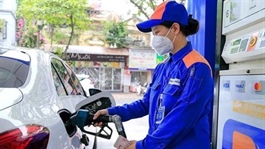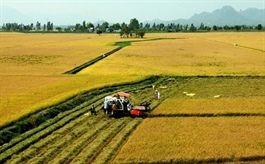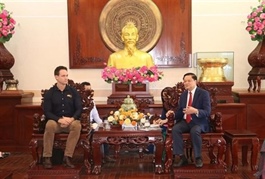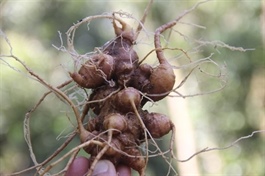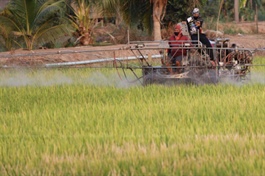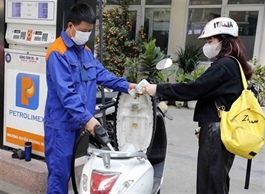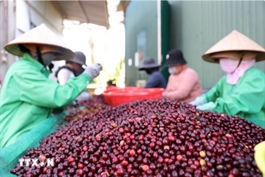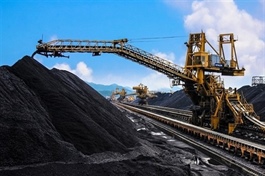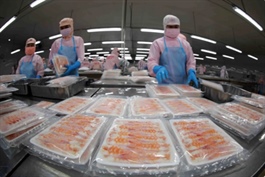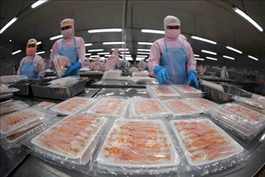Bạc Liêu develops the shrimp industry value chain
Bạc Liêu develops the shrimp industry value chain
With available potential and advantages, the Mekong Delta province of Bạc Liêu has been developing many shrimp farming models applying high technology, being environmentally friendly, enhancing the value chain and becoming a leading locality in the country in this field.
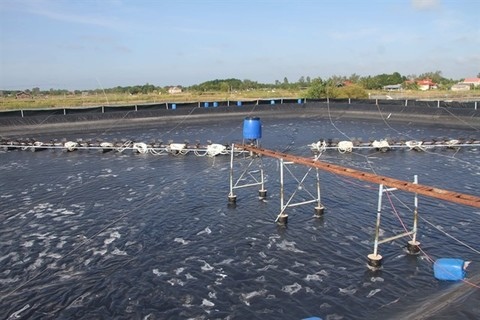
High-tech shrimp ponds of farmer in Bạc Liêu Province's Đông Hải Distrct. — VNA/VNS Photo |
To aim for sustainable development and environmental protection, the provincial government always raises awareness of the importance of protecting the environment among businesses and shrimp farmers.
Phạm Minh Sang, a shrimp farmer in Bạc Liêu, said since 2010, he has invested in switching to a super-intensive shrimp farming model applying technology that generates electricity via biogas and deals with sludge effectively.
The closed-cycle shrimp farm model, in which sludge and other organic waste from shrimp ponds are mixed and fed into a methane fermenter to produce biogas, which is desulfurised to generate electricity.
This model can help farming households ensure good farming environment and limit emissions into the environment.
The amount of emissions during shrimp breeding is very high, so farming households need to have a Biogas digester. When the water environment in the farming area is effectively treated, productivity will increase, Sang said.
Trương Kiều Diễm, a shrimp farmer in Đông Hải District, said the Biogas model also takes advantage of the gas source from Biogas to generate electricity.
Currently, the provincial government is promoting the development of many super-intensive shrimp farming models that apply high technology.
Super-intensive shrimp farming is considered to have many outstanding advantages. This is a model with a success rate of over 70 per cent, an average yield of more than 22 tonnes per hectare per year, short farming time and guaranteed shrimp quality.
This model thrives in coastal areas such as Bạc Liêu City, Hòa Bình, Đông Hải and Giá Rai districts.
Although there are many outstanding advantages, super-intensive shrimp farming requires high investment capital. Therefore, not many shrimp farmers can pursue it.
Environmental issues are also a significant obstacle. Because super-intensive shrimp farming uses a large amount of water and food sources, large amounts of untreated waste discharged into the environment will cause serious pollution.
Tạ Hoàng Nhiệm, chairman of the Bạc Liêu Province Shrimp Association, said currently, the super-intensive shrimp farming model applying high technology is very effective. But the amount of waste released into the environment is huge.
Therefore, it is necessary to develop and apply shrimp farming according to the water circulation process, both ensuring the environment and bringing economic benefits to farmers.
Nguyễn Trọng Hán, Deputy Chairman of the People's Committee of Đông Hải District, said Biogas digesters have been built for 248 super-intensive shrimp farming places in the district, with the support of ActionAid Việt Nam and Bread for the World (BfdW). Thereby, it is contributing to solving environmental problems.
Nguyễn Trung Hiếu, Deputy Director of the province's Department of Agriculture and Rural Development, said that to achieve sustainability goals, aquaculture activities need to be strictly managed to minimise negative impacts on the environment.
In addition to developing intensive and super-intensive shrimp farming models, Bạc Liêu is also focusing on developing types of shrimp farming that reduce greenhouse gas emissions such as shrimp-rice and shrimp-forest farming models.
According to the provincial People's Committee, in 2023, its export turnover is estimated to reach US$1 billion for the first time, an increase of 17.21 per cent over the same period. Of which, shrimp exports reached US$973.6 million, an increase of 17.26 per cent over 2022.
According to Chairman of Bạc Liêu Provincial People's Committee Phạm Văn Thiều, the locality has three main export products, which are shrimp, rice and salt.
Among them, the main export product is shrimp, accounting for over 95 per cent of the province's export turnover.
The province's goal is to reach $1.3 billion in shrimp exports by 2025 and $1.7 billion by 2030.
Currently, there are 48 export seafood processing factories in the province, with modern equipment lines and a designed processing capacity of about 294,000 tonnes per year. Shrimp products have been processed to meet standards and penetrated demanding markets such as the US, Japan, EU, China and South Korea.
With the goal of building Bạc Liêu to soon become "The shrimp industry hub of the country", the province is aiming to create the brand "Bạc Liêu clean shrimp" and develop the value chain of its shrimp industry in the future.
In the coming time, Bạc Liêu has identified high-tech shrimp farming models as its main development direction.
Accordingly, Bạc Liêu will promote the application of science and technology in seafood production linked with environmental protection to increase productivity, quality and sustainable development.







